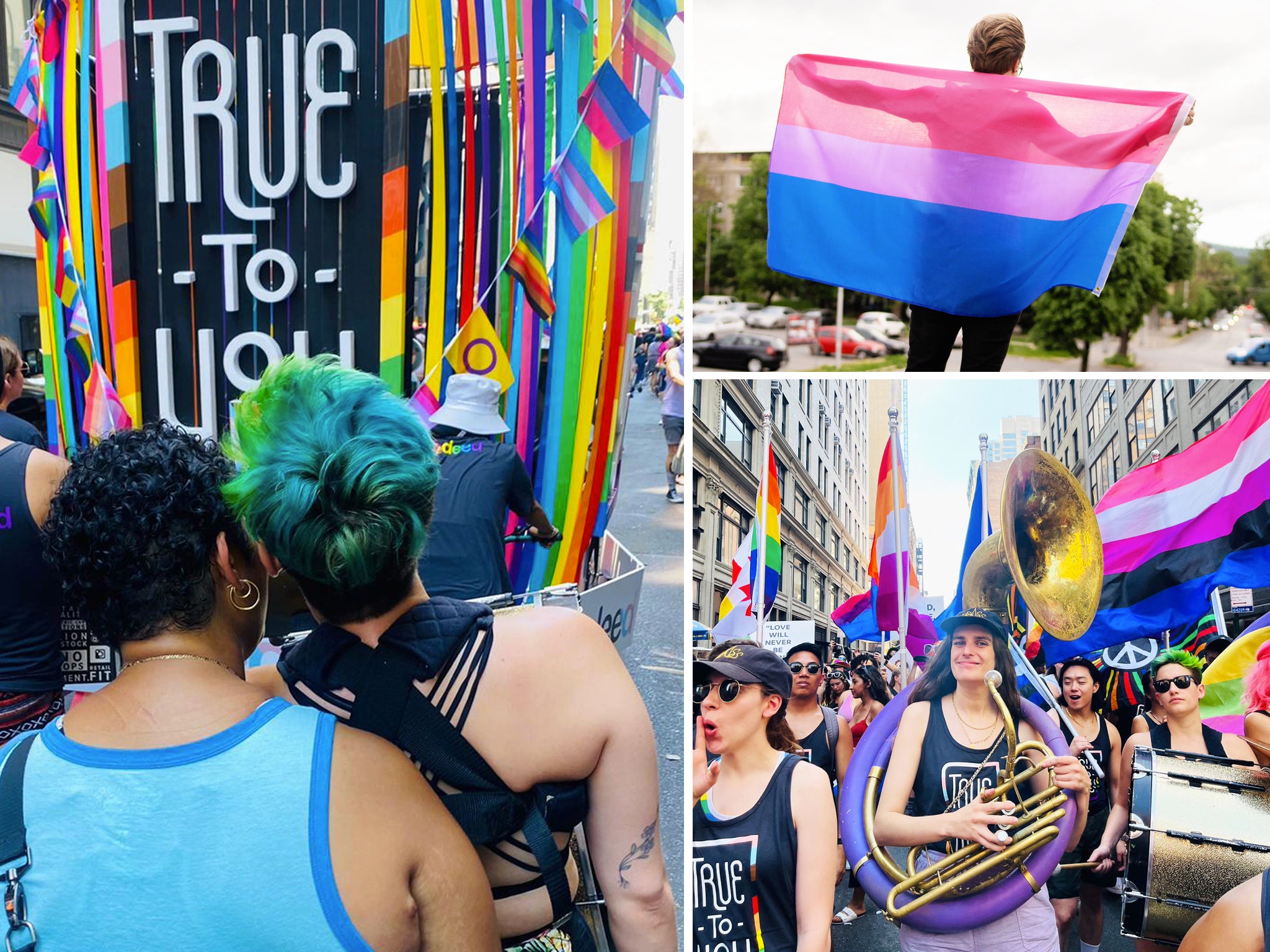Why is it so hard to come out as bisexual?
Marching in this year’s Pride parade felt like a breakthrough moment - but not all declarations need to be so grand, writes Lucy Anna Gray


Your support helps us to tell the story
From reproductive rights to climate change to Big Tech, The Independent is on the ground when the story is developing. Whether it's investigating the financials of Elon Musk's pro-Trump PAC or producing our latest documentary, 'The A Word', which shines a light on the American women fighting for reproductive rights, we know how important it is to parse out the facts from the messaging.
At such a critical moment in US history, we need reporters on the ground. Your donation allows us to keep sending journalists to speak to both sides of the story.
The Independent is trusted by Americans across the entire political spectrum. And unlike many other quality news outlets, we choose not to lock Americans out of our reporting and analysis with paywalls. We believe quality journalism should be available to everyone, paid for by those who can afford it.
Your support makes all the difference.There are no rules to coming out. It’s a lawless, shifting terrain that’s impossible to balance on. The floor is lava, the floor is soft sand, the floor is awkwardly talking to your loved ones about sex.
I often find myself crowbarring references to my bisexuality into conversation. The habit has always felt strange, even embarrassing, when blurting out an irrelevant, overly personal anecdote. It has been an anxiety-inducing, self-inflicted dance, oscillating between pushing myself into conversations and assuring others that I know my experiences will be far, far easier than others in the LGBT+ community. It’s a purple-tinged gray area with an implicit burden of proof the less assured among us can find ourselves stuck in. I am part of the community…maybe not at the moment…I hear your experiences…but I don’t assume to understand them…
It’s 2023, but there is still a vagueness around coming out as bisexual that casts a shadow over me. I live in Brooklyn, I work at The Independent, I’m surrounded by wonderful – if ridiculous – friends and family. We’re rapidly ticking off the queer-friendly checklist, so why have I found coming out so difficult?
As it turns out, I’m far from alone.
Bisexual people consistently represent the largest identity group among LGBT+ people – both among adults and young people. “Despite the increased visibility of LGBT+ people over the last few years, bi+ people are still often less visible than gay and lesbian people,” Violet Lhant, Public Education and Research Coordinator for Human Rights Campaign, told me. She points out some of the harmful stereotypes rife in culture that contribute to this feeling: “That we’re promiscuous, incapable of fidelity, or that we have to ‘pick a side.’ As a result, it can be more difficult for bi+ people to find the place where we belong.” It would seem other purple comrades feel similar to my years-long trepidation.
“Some bi+ people have long struggled with living the lives we think we’re supposed to live, instead of the lives we know we were meant for and want to live,” Lhant says. “This is due to things like biphobia or bi erasure from both straight and cisgender people, and LGBTQ+ people.”
I have often noticed that bi-erasure is something people sneer at or joke about. Don’t get me wrong, I get it - a privileged white woman dating a man complaining about being erased? Cry me a river. But I’m slowly trying to appreciate that sexuality isn’t a competition. There aren’t any medals in the Oppression Olympics (but if there was I know I wouldn’t get gold I’m sorry I’m sorry). “Stereotypes such as bi+ identities being phases can also complicate the coming out process for bi+ people,” Lhant said. “Correcting these assumptions often forces bi+ people to come out over and over again and constantly push back against biphobia, which can be daunting and draining.” It wasn’t until I saw this written in black and white that I realised that was exactly what I have spent the last 10 years doing: coming out over and over again, clearly from a place of affirmation but ultimately exhausting myself.
I date a cishet man who watches college football, drinks cheap lager and can’t find the remote even when I’ve pointed directly at it and described its location in minute detail. All of my long-term relationships have been with men. I can count my dates with women on two hands, whereas with men…well, let’s not go there shall we? So I was curious to know if others feel this need to legitimize their sexuality based on their current partner.
“Because the sexuality of many bi+ people is often assumed to be gay, lesbian, or straight based on the gender of our partner(s) or spouse, or our dating history, bi+ people are often invisible even in LGBTQ+ spaces,” Lhant explains.
Invisible is certainly how it can feel, or perhaps dormant is more apt. But this Pride, I truly tried to take these sentiments to heart. The last few weeks, I have been more out and open than ever, despite being in a monogamous, hetero relationship. I marched in the – oh so sweaty – NYC Pride parade. I confidently joined in at the bar proffering very personal opinions when discussing the seemingly endless reel of anti-LGBT+ legislation being rolled out. I mentioned my bisexuality when it felt relevant, but didn’t crowbar it in as proof. And, most uncomfortably but surprisingly important to me, I told my partner that I wanted to feel more seen this Pride. (A request which was met with the occasional text saying ‘Happy Pride’ rainbow flag emoji, links to TikToks about bi-erasure, and a toast to my queerness at the bar before the march.)
“The first step to coming out is being open with oneself. This can be a challenge due to harmful stereotypes about bi+ people,” Lhant says. “Many bi+ people experience bi erasure when others doubt their bi+ identity, claim bi+ people are just confused or experimenting, or that bisexuality is just a ‘stepping stone’ toward being gay or lesbian. Bi+ is its own valid identity, and so are all of the identities under the bi+ umbrella.”
It felt wildly alien for me to push this need to be seen, as if by doing so I would be taking attention, awareness and affirmation away from someone more deserving of it – but of course that’s not how it works, is it? My boyfriend raising an espresso martini to toast me while wearing a Pride shirt might seem silly – perhaps even gauche to my usually sardonic sensibilities – but by golly it felt nice to be seen, and it didn’t take anything away from anyone else.
If a loved one comes out to you as bi+, there are extensive tools to help (I point you to, for example, the HRC). But in addition to the important ways to make sure they are safe and loved, I have my own, smaller advice. Simple acts of celebration can go a long way. Gay friends that include me in the conversation - even if it’s joking about my very straight boyfriend - and don’t belittle me, straight friends that come along to Pride events; just these small nods here and there make a difference.
For some coming out is a safe, maybe even fun, experience; for others it can be dangerous and terrifying. Whether it’s a grand declaration, a subtle comment here and there, or not even necessary, we all ‘come out’ in vastly different ways. And then there’s the added complication that it is not the isolated experience TV would have us believe; as the years go on you will likely end up doing it time and time again in some form or another.
So, it seems that as long as we exist in a label-loving society, coming out is inevitable for much of the LGBT+ community. The fluid, ever-changing, nature of sexuality doesn’t necessarily lend itself to definitive declarations, but here we are.
From a childhood of peers thinking there was nothing funnier than calling someone gay, to a life where many I know don’t even feel the need to “come out”, a lot has changed. Just the other day a friend slipped into conversation over dinner that she had been on a date with a woman for the first time, met with rapturous cheering and toasting of papadums over our curry. The fight is far from over, perhaps it never will be, but the world I see is a very different one from a young Lucy quietly thinking “wait a moment, I think I…like like Anne Hathaway.” (Old Lucy too, like likes Anne Hathaway).
When you come out there is often a feeling to “prove it” somehow. But no one should have to prove themselves to be respected for who they are.


Join our commenting forum
Join thought-provoking conversations, follow other Independent readers and see their replies
Comments